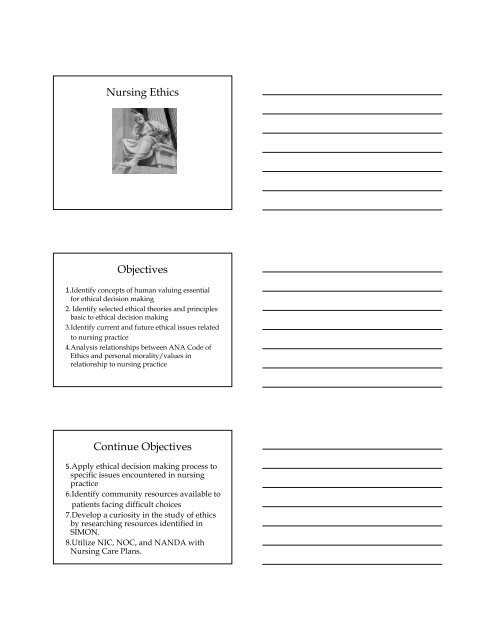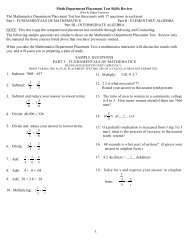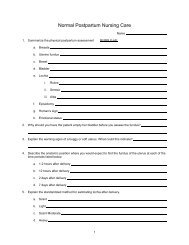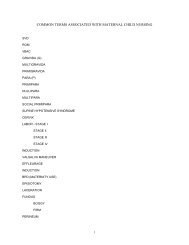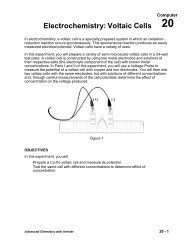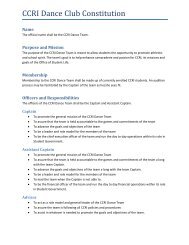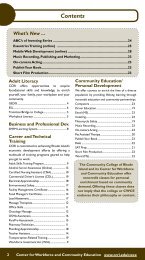Nursing Ethics Objectives Continue Objectives
Nursing Ethics Objectives Continue Objectives
Nursing Ethics Objectives Continue Objectives
You also want an ePaper? Increase the reach of your titles
YUMPU automatically turns print PDFs into web optimized ePapers that Google loves.
<strong>Nursing</strong> <strong>Ethics</strong><br />
<strong>Objectives</strong><br />
1.Identify concepts of human valuing essential<br />
for ethical decision making<br />
2. Identify selected ethical theories and principles<br />
basic to ethical decision making<br />
3.Identify current and future ethical issues related<br />
to nursing practice<br />
4.Analysis relationships between ANA Code of<br />
<strong>Ethics</strong> and personal morality/values in<br />
relationship to nursing practice<br />
<strong>Continue</strong> <strong>Objectives</strong><br />
5.Apply ethical decision making process to<br />
specific issues encountered in nursing<br />
practice<br />
6.Identify community resources available to<br />
patients facing difficult choices<br />
7.Develop a curiosity in the study of ethics<br />
by researching resources identified in<br />
SIMON.<br />
8.Utilize NIC, NOC, and NANDA with<br />
<strong>Nursing</strong> Care Plans.
<strong>Nursing</strong> <strong>Ethics</strong><br />
What is nursing ethics?<br />
Healthcare <strong>Ethics</strong> or Physician <strong>Ethics</strong>?<br />
Subcategory of Bioethics<br />
Physician <strong>Ethics</strong><br />
Nurse <strong>Ethics</strong><br />
What is <strong>Ethics</strong><br />
The formal systematic study of moral<br />
beliefs using philosophical theories as<br />
foundations and guides to identify and<br />
resolve ethical issues.<br />
<strong>Ethics</strong>/Morals/Values<br />
These are all terms used in the discussion<br />
of ethical issues and sometimes it appears<br />
that they are used interchangeably
Values<br />
Values<br />
• Values are the rules by which we make decisions about<br />
right and wrong, should and shouldn't, good and bad.<br />
They also tell us which are more or less important,<br />
which is useful when we have to trade off meeting one<br />
value over another.<br />
• Dictionary.com defines values as:<br />
n : beliefs of a person or social group in which they<br />
have an emotional investment (either for or against<br />
something); "he has very conservatives values"<br />
Morals<br />
Morals<br />
• Morals have a greater social element to values<br />
and tend to have a very broad acceptance.<br />
Morals are far more about good and bad than<br />
values. We thus judge others more strongly on<br />
morals than values. A person can be described as<br />
immoral, yet there is no word for them not<br />
following values.<br />
Dictionary.com defines morals as:<br />
• n : motivation based on ideas of right and wrong<br />
Good vs Evil
<strong>Ethics</strong><br />
• <strong>Ethics</strong><br />
You can have professional ethics, but you seldom hear about<br />
professional morals. <strong>Ethics</strong> tend to be codified into a formal system<br />
or set of rules which are explicitly adopted by a group of people.<br />
Thus you have medical ethics. <strong>Ethics</strong> are thus internally defined and<br />
adopted, while morals tend to be externally imposed on other<br />
people.<br />
• If you accuse someone of being unethical, it is equivalent of calling<br />
them unprofessional and may well be taken as a significant insult<br />
and perceived more personally than if you called them immoral<br />
(which of course they may also not like).<br />
Dictionary.com defines ethics as:<br />
• The rules or standards governing the conduct of a person or the<br />
members of a profession.<br />
Choices?
Ethical Theories<br />
• Teleologic Theory or Consequentialism<br />
Utilitarianism<br />
• Deontologic or Formalist Theory<br />
Utilitarianism<br />
Bentham, Jeremy ‐ 1748–1832, English<br />
philosopher, jurist, political theorist, and<br />
founder of utilitarianism. Educated at Oxford,<br />
he was trained as a lawyer<br />
Jeremy Bentham
Utilitarianism<br />
• Outcome focused<br />
• Morality of an act is determined solely by its<br />
consequences<br />
• “The ends justify the means”<br />
• “The greatest good for the greatest number”<br />
• Consequences are evaluated in light of their<br />
ability to promote group good<br />
John Stuart Mills<br />
Immanuel Kant
Deontology<br />
• Deontological ethics, beneficence and<br />
nonmaleficence. Introduced John Stuart Mill,<br />
of the founder of DeontologicalThought.John<br />
Stuart Mill (1806‐1873), British philosopher,<br />
economist, moral and political theorist, and<br />
administrator, was the most influential<br />
English‐speaking philosopher of the<br />
nineteenth century.<br />
•<br />
Deontology<br />
• Immanuel Kant‐believed that an act was moral if it<br />
originated from good will<br />
• Act or Rule Deontology<br />
• Act ‐the right thing to do comes from gathering all the<br />
facts and then making a decision<br />
• Rule‐principle guide our actions( always keep<br />
promises)<br />
Deontology<br />
• Basic principle governing behavior is duty<br />
• There is a particular rule which must be followed<br />
regardless of his/her desires or any foreseeable<br />
results<br />
• No control over the nature of his/her duty<br />
• Entirely concerned with the actions, not the<br />
consequences<br />
• Does not allow for choices<br />
• Importance of the individual person, not the group
Meta‐ethics<br />
Applied ethics<br />
Approaches to <strong>Ethics</strong><br />
ANA Code of <strong>Ethics</strong> for Nurses<br />
Provision 1<br />
• “The nurse, in all professional relationships,<br />
practices with compassion and respect for the<br />
inherent dignity, worth, and uniqueness of<br />
every individual, unrestricted by<br />
considerations of social or economic status,<br />
personal attributes, or the nature of the<br />
health problem.”<br />
ANA Code of <strong>Ethics</strong> for Nurses<br />
Provision 2<br />
• “The nurse’s primary commitment is to<br />
the patient, whether an individual,<br />
family, group or community.”
ANA Code of <strong>Ethics</strong> for Nurses<br />
Provision 3<br />
• “The nurse promotes, advocates for, and<br />
strives to protect the health, safety, and<br />
rights of the patient.”<br />
ANA Code of <strong>Ethics</strong> for Nurses<br />
Provision 4<br />
• “The nurse is responsible and<br />
accountable for individual nursing<br />
practice and determines the appropriate<br />
delegation of tasks consistent with the<br />
nurse’s obligation to provide optimum<br />
patient care.”<br />
ANA Code of <strong>Ethics</strong> for Nurses<br />
Provision 5<br />
• “The nurse owes the same duties to self<br />
as to others, including the responsibility<br />
to preserve integrity and safety, to<br />
maintain competence, and to continue<br />
personal and professional growth.”
ANA Code of <strong>Ethics</strong> for Nurses<br />
Provision 6<br />
• “The nurse participates in establishing,<br />
maintaining, and improving health care<br />
environments and conditions of employment<br />
conducive to the provision of quality health<br />
care and consistent with the values of the<br />
profession through individual and collective<br />
action.”<br />
ANA Code of <strong>Ethics</strong> for Nurses<br />
Provision 7<br />
• “The nurse participates in the<br />
advancement of the profession through<br />
contributions to practice, education,<br />
administration, and knowledge<br />
development.”<br />
ANA Code of <strong>Ethics</strong> for Nurses<br />
Provision 8<br />
• “The nurse collaborates with other<br />
health professionals and the public in<br />
promoting community, national, and<br />
international efforts to meet health<br />
needs.”
ANA Code of <strong>Ethics</strong> for Nurses<br />
Provision 9<br />
• “The profession of nursing, as<br />
represented by associations and their<br />
members, is responsible for articulating<br />
nursing values, for maintaining the<br />
integrity of the profession and its<br />
practice, and for shaping social policy.”<br />
Ethical principles<br />
• Permit people to take a consistent position on<br />
issues<br />
– Autonomy ‐ own decisions<br />
– Beneficence ‐ do no harm<br />
– Nonmaleficence ‐ duty to do no harm (Hippocratic<br />
oath)<br />
– Veracity ‐ telling the truth (foundation for trust)<br />
– Fidelity ‐ honoring one’s promises<br />
– Justice ‐ all treated equally<br />
Autonomy<br />
• A person’s right to be what she/he is and to<br />
be dealt with according to that uniqueness<br />
• Personal independence and self‐directedness<br />
• Self‐freedom and self‐determination<br />
• Nurses respect a patient’s right to be unique<br />
and to be involved in the decision‐making<br />
process
Veracity<br />
• The imparting of knowledge to another when this<br />
knowledge will do that other some good or at least<br />
do more good than harm<br />
• Truth‐telling<br />
– “The life of a sick person can be shortened not only by the<br />
acts, but also by the words or manner of a<br />
physician….Avoid all things that have a tendency to<br />
discourage the patient and to depress his spirit” (Medical<br />
Association Code of <strong>Ethics</strong> , 1847)<br />
• Requires that the nurse accept the truth concerning<br />
the unique nature of the patient<br />
Fidelity<br />
• Adherence to the terms of an agreement<br />
• Live up to a patient’s reasonable expectations<br />
• Fundamental to the nurse/patient<br />
relationship<br />
• Commitment to the obligation that a nurse<br />
has accepted when accepting the role of nurse<br />
Justice<br />
• The act of establishing proportionality on<br />
behalf of one whose rightful purposes have<br />
been interfered with by another or who has<br />
lost the product of his actions through the<br />
actions of another<br />
• Fairness
Ethical decision‐making model<br />
• Identify the ethical issues and problems<br />
– State nature of the ethical dilemma<br />
• Identify and analyze available alternatives for action<br />
– List all possible actions, not only your own<br />
• Select one alternative<br />
– Step back and consider the situation<br />
• Justify the selection<br />
– Communicate thoughts during explanation of reasoning<br />
process<br />
• Assess<br />
• Identify<br />
• Intervene<br />
• Evaluate<br />
<strong>Nursing</strong> Care Plan<br />
Patient’s Bill of Rights<br />
• Consideration of privacy<br />
• Informed consent for treatment<br />
• Refuse treatment<br />
• Confidentiality<br />
• Right to know all rules and refuse research<br />
• Continuity of care<br />
• Explanation of bill
Patient Self‐Determination Act<br />
of 1990<br />
• Advance directives<br />
– Living wills<br />
– Durable power of attorney for health care<br />
• Any institution receiving federal money must<br />
provide written information to patients regarding<br />
the right to make health care decisions including<br />
right to refusal, appoint a proxy, writing advance<br />
directives to guide treatment<br />
Bioethical issues<br />
• Physician assisted suicide<br />
– The patient’s self‐determination right<br />
vs.<br />
– The physician’s rule to “do no harm”<br />
– The health care provider’s right not to perform an<br />
act she/he believes to be immoral<br />
– The patient’s right to decide his/her own fate<br />
Bioethical issues<br />
• Reproductive technology<br />
– artificial insemination<br />
– surrogate motherhood<br />
– vitro fertilization<br />
– genetic research<br />
• stem cell<br />
• cloning<br />
• human genome project
Bioethical Issues<br />
Bioethical issues<br />
• Allocation of resources<br />
–fair and equal treatment<br />
–transplants<br />
–solutions<br />
• rationing<br />
• use of technology<br />
• preventive care<br />
Which Choice to Make?
“It is the nurse’s ethical obligation to<br />
uphold the highest standards of<br />
practice and care, assume full<br />
personal and professional<br />
responsibility for every action, and<br />
commit to maintaining quality in the<br />
skill and knowledge base of the<br />
profession.”


